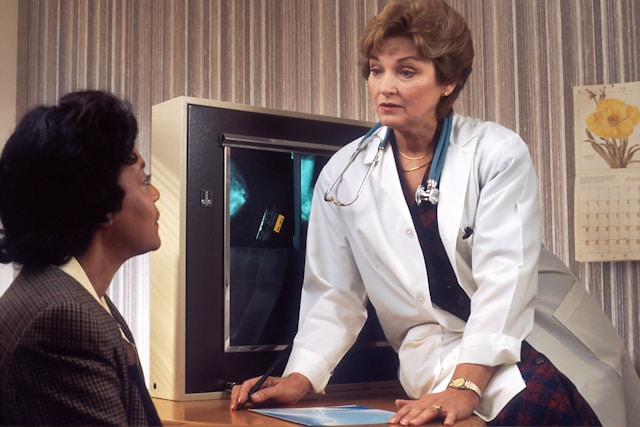In healthcare, specialized nurses play an extremely important role — especially those who work in psychiatry and mental health. Their knowledge and skills are essential in the field of promoting, protecting, and treating mental health. They contribute to helping people cope with the many ways that different circumstances, including gender, can affect mental health.
There are certain mental health issues that affect women, which are impacted by social, psychological, and biological factors. As specialized nurses, psychiatric mental health nurse practitioners can make diagnoses and provide treatment.
This article will go over the importance of these specialized nurses in improving and managing women’s mental health.
How psychiatric mental health nurse practitioners make a difference
Psychiatric mental health nurse practitioners (PMHNPs) contribute greatly to treatments that address women’s mental health issues. These medical specialists are a great resource of information and expertise, with a deep understanding of the health problems that women experience related to psychiatric therapy. They ensure a complete approach to care by using a wide range of approaches, including psychotherapy and medication prescription.
Thanks to their specialized training, they are able to identify and manage mental health issues as they arise in women, particularly those associated with pregnancy and the postpartum phase. By establishing safe places and cultivating an atmosphere of trust, PMHNPs play a crucial role in enabling women to talk about their mental health issues. They adapt their treatment techniques to each woman’s unique life stage and the issues it may bring by taking a gender-sensitive approach.
This might include discussing the emotional effects of infertility, managing the mental health effects of menstruation disorders, or assisting women in dealing with menopause. Their work also includes addressing the psychological effects of trauma and gender-based abuse and offering treatments that can promote healing and recovery.
PMHNPs work closely with other medical professionals in their practice and support a multidisciplinary approach to women’s health. This partnership guarantees that treatment programs are comprehensive, addressing both physical and mental health issues that may have an impact on a woman’s psychological health. Psychiatric mental health nurse practitioners make a substantial contribution to the advancement of women’s mental health, improving the standard of care and assisting women in reaching their best possible mental health.
How to become a qualified nurse practitioner
In order to become qualified as a specialized nurse, such as a PMHNP, registered nurses can complete a convenient online course through a reputable institution, such as Wilkes University, that will provide the needed credentials to enter the workforce and begin a long and beneficial career as a qualified nurse practitioner. Wilkes University’s Master of Science in Nursing (MSN) – Nurse Practitioner course is comprehensive and is designed to allow students to become nurse practitioners in as little as two years. This BSN to MSN online program serves as a gateway to highly rewarding work caring for people who need help.
The course includes:
- Entirely virtual coursework without the need to commute to campus
- The choice of three nurse practitioner concentrations, allowing students to choose their path, including psychiatric/mental health
- Self-paced study for those who prefer to study part-time
Pursuing an advanced career as an NP is a unique opportunity to take a big step toward helping people improve their health and their lives.
Recognizing the mental health issues specific to women
Women deal with a maze of mental health issues that are closely linked to their hormonal and biological makeup, in addition to other factors like social norms and personal experiences. These challenges include a range of hormonal conditions that can have an impact on mood and overall health, such as premenstrual syndrome (PMS) and premenstrual dysphoric disorder (PMDD), which can cause severe emotional distress for many women on a monthly basis.
Pregnancy, childbirth, and the postpartum phase present additional mental health hazards, including postpartum depression and anxiety, which can significantly affect a mother’s well-being and her capacity to form a bond with her infant. Women also have a greater risk of several anxiety disorders and are more prone to suffer from the long-term consequences of trauma, such as post-traumatic stress disorder (PTSD), which is frequently caused by abusive experiences which are regrettably more common in women.
The demands of cultural norms and expectations are added to this, and they can have a severe negative impact on women’s mental health by causing cycles of stress and feelings of inadequacy. The stigma associated with mental health issues and these social expectations can discourage women from getting the treatment they need.
This combination of issues highlights the need for specialized care that takes into account all aspects of women’s mental health, both psychological and physiological. For many women suffering from these mental health difficulties, specialized nurses can provide effective and proven treatments.
Handling postpartum depression
Many women struggle with postpartum depression (PPD) at the sensitive time after giving birth. PPD can seriously interfere with the process of mother-child bonding and have an impact on a mother’s mental and emotional well-being. Psychiatric mental health nurse practitioners are essential in recognizing and treating this illness. Their strategy is to fuse clinical knowledge and empathy to assist new moms in this delicate period.
Through the use of screening instruments intended to identify PPD symptoms early on, these practitioners can act quickly to reduce the likelihood of the disorder becoming worse. Depending on the specific requirements of each mother, treatment plans can combine medication and counseling. By debunking misconceptions and lowering the stigma attached to postpartum depression, these nurses play a critical role in educating mothers and their families and inspiring more women to get the support they need.
PMHNPs are trained to be aware of the psychological and physiological changes that take place after delivery and to provide holistic care. This involves offering options for extra support as well as guidance on lifestyle changes like exercise and diet that can help minimize some of the symptoms. These experienced nurses are a reliable source of help, providing guidance to new moms who are experiencing postpartum depression.
Managing endocrine disorders and their effects on mental health
For many women, changes in mental health are closely associated with hormonal imbalances and disorders such as PMDD, PCOS, and the transition into menopause. Shifting hormones can cause or worsen anxiety, sadness, and mood disorders, which can have a significantly negative impact on a woman’s quality of life.
To address these difficulties head-on, specialized nurses like psychiatric mental health nurse practitioners have special skills. They can offer an approach to therapy that is tailored to the patient’s hormonal and mental health needs by combining their understanding of physical and mental health. These medical specialists help women manage the psychological effects of hormonal disorders using a range of techniques. This can include in-depth evaluations to determine the degree to which hormones affect mental health and offering psychoeducation to assist women in identifying and managing symptoms with individualized treatment.
Plans like these can include behavioral treatment to help women learn to better cope with mood swings and other psychological impacts of their situation, along with prescription management to address chemical imbalances. PMHNPs are also an effective source of assistance. They provide guidance through the upsetting symptoms that go along with hormone issues. They collaborate with endocrinologists and other professionals to provide a treatment plan that addresses the complex relationship between hormonal problems and mental health. In these ways, the mental health of women with hormone disorders is greatly helped by the committed work of specialized nurses.
Boosting mental health while expecting
Pregnant women experience a wide range of feelings, from excitement and anticipation to worry and anxiety. Significant hormone swings occur during this time, which can influence a pregnant mother’s mental health. During this transitional stage, specialized nurses such as PMHNPs are essential. Their obstetric and mental health care knowledge allows them to recognize and manage many psychological issues.

These medical specialists are qualified to offer pregnant patients personalized assistance and guidance on the emotional complications of being pregnant. They provide coping mechanisms for mood swings and help to resolve anxieties related to becoming a mother and giving birth. They can even identify symptoms of more severe mental health disorders, such as anxiety or depression in pregnancy. They can act quickly to ensure the well-being of the mother and baby by providing the necessary treatment.
Incorporating mental health as a critical aspect of perinatal medicine through collaboration with obstetricians and midwives ensures a comprehensive approach to treatment. Specialized nurses inspire pregnant moms by building resilience and psychologically preparing them for the road ahead via education and care.
They’re essential in developing a postpartum care plan that ensures a smooth transition and ongoing mental health assistance. Having conversations with expectant mothers about postpartum planning, which encompasses mental health aspects, helps reduce the likelihood of postpartum depression and anxiety.
Increasing understanding of women’s mental health
In the fight against the stigma attached to women’s mental health concerns, specialized nurses are essential. They put in great effort to educate communities and provide a supportive and understanding atmosphere. Their participation in educational programs is essential because they use their wealth of knowledge and experience to educate the public about the specific difficulties women face when it comes to mental health. Through lectures, social media campaigns, and workshops, they work to debunk myths and create a more inclusive conversation around mental health.
These healthcare professionals can reach a wider audience by working with community organizations, employers, and schools. This helps them to emphasize the significance of early detection of mental health issues and seeking assistance. They promote mental well-being by fighting for local and national policies that support women’s mental health and make mental health treatment available and affordable for all women.
Specialized nurses can encourage dialogue around women’s mental health by teaming up with other medical professionals and presenting a combined effort addressing the many areas of mental well-being. They support a comprehensive healthcare strategy that recognizes the link between physical and mental health, especially with women’s health challenges, by sharing their ideas and methods. Specialized nurses are not only changing the face of women’s mental health care through advocacy, but they’re also enabling women to speak out regarding their own mental health, creating a better, healthier future for all women.
Specialized nursing is progressing all the time
Specialized nursing creates a major impact, especially in the area of women’s mental health. There will be an increasing need for qualified PMHNPs as society comes to recognize the need for gender-specific mental health treatment. These committed professionals now have the chance to innovate and improve the care provided to women at all phases of life as a result of this increase in recognition. In the upcoming years, PMHNPs will be even more empowered to reach women in distant and underserved regions and remove obstacles to access, thanks to technology in healthcare delivery, including telemedicine and online mental health resources.
With specialized nurses collaborating with psychologists, obstetricians, and endocrinologists to provide a holistic approach to therapy that addresses both the mind and body, this collaboration will also improve the quality of care. Research and professional development will be essential and create evidence-based approaches to the mental health needs of women. These nurses are equipped with the newest information and methods in psychiatric treatment, thanks to their graduate degrees and specialized certifications.
Specialized nurses play a key role in women’s health
Specialized nurses are some of the most important supporters of women’s health. They use the techniques discussed above to help women who suffer from a wide variety of circumstances and illnesses.
Moving forward, women’s mental health treatment will be more easily available and customized, thanks to these qualified specialized nurses. Their dedication to this goal is expected to have a long-lasting effect, promoting a society that is healthier and happier.
Featured Photo by National Cancer Institute on Unsplash
